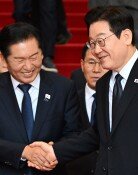Reporting of O`seas Accts Fueling Intra-gov`t Dispute
Reporting of O`seas Accts Fueling Intra-gov`t Dispute
Posted March. 10, 2010 04:43,
Government agencies are fighting over the introduction of a system imposing penalties and criminal punishment on those failing to report their foreign financial accounts to authorities.
The National Tax Service Tuesday says this is a practical regulation to prevent the hiding of assets abroad, but the Strategy and Finance Ministry calls the rule ineffective and warns of the potential victimization of innocent people.
The disputed bills are a revised bill on international tax adjustment and another on punishing tax criminals sponsored by ruling Grand National Party lawmaker Lee Hye-hun and signed by 12 ruling and opposition party members.
The revised bills mainly focus on the mandatory reporting of foreign financial accounts and were first discussed by the tax subcommittee under the National Assemblys Strategy and Finance Committee Feb. 23.
The bills require Korean nationals and corporations with overseas financial accounts to report the details -- the name of the financial institution, country, account number, and amount -- in the previous year to the National Tax Service by June. Failure to do so under the bills will result in criminal punishment.
A late or false filing will incur a fine of under 100 million won (88,105 U.S. dollars). If the account balance in the year exceeds 500 million won (440,528 dollars), violators will be subject to a prison sentence of three years or less or a fine of 20 percent of the highest bank balance or less.
In a time of need to increase tax revenues, stricter management of income leakage abroad is the most appropriate way to secure revenues given few side effects and the realization of tax justice, a tax official said.
Another reason is the few regulations to prevent large companies from hiding assets in other countries, and this issue has proven controversial several times.
Korea has a system under which one must report the inflow or outflow of foreign currencies under foreign exchange rules, but this is not a mandatory system that can prevent and spot individuals or companies from hiding assets or leaking income.
Even if the overseas assets of a suspect who allegedly tried to report his or her income under what he or she earned is identified, there is no legal grounds for punishment if the link of the assets and attempt is not proven.
If the new system is introduced, however, would-be perpetrators can be punished for not reporting their foreign financial accounts to the government.
The case for the new system is identifying the tax base of overseas financial accounts. The National Tax Service said, We rely on planned irregular audits to detect and regulate income leaks overseas.
Just the U.S. Internal Revenue Service aggressively supports the Foreign Bank and Financial Accounts program, Korea must adopt such program, the Korean tax office said.
The Strategy and Finance Ministry, however, opposes early adoption of the program, urging a careful review over the long term.
In a report submitted to the National Assembly, the ministry said, Those who hide assets abroad and evade taxes are already punished under current law, but despite this, tax evaders secretly send their assets overseas. It is questionable whether they will ever report their taxes even if the new reporting system is introduced.
The ministry also said the change will inconvenience people unrelated to hiding assets overseas, such as those who work or study abroad. For example, the parents of those studying abroad (250,000 people as of 2008) must report to the government when they wire money for tuition, which is unrelated to tax evasion.
Those who stay abroad to work for a Korean company and those overseas who are reporting their incomes to the National Tax Service must report additional foreign accounts. This is feared to lead to the prosecution of innocent victims such as good taxpayers or those who know little about the law.
When the first meeting was held at the tax subcommittee last month, members reportedly did not clearly express their views. Given that the sponsor of the bills is the subcommittee chairman, the bills are likely to be passed.
Rep. Lee, the sponsor of the bills, told The Dong-A Ilbo over the phone yesterday, The government is trying to sign a tax cooperation agreement (which offers information on accounts in a foreign country if the account holders name and account number are offered) with Switzerland, a so-called tax haven, and this agreement is effective when the minatory reporting system is introduced.
These bills will be a priority in the extraordinary parliamentary session in April, he said. If the reporting bar is set at 500 million won (440,528 dollars) in account balance, there will be no innocent victims such as students or workers abroad.
surono@donga.com







